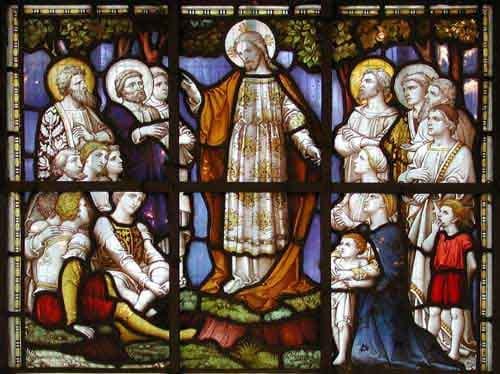POPE FRANCIS ON THE 26TH SUNDAY IN ORDINARY TIME YEAR B

ANGELUS
Saint Peter’s Square
26th Sunday in Ordinary Time Year B, 26 September 2021
____________________________
Dear brothers and sisters, buongiorno!
The Gospel of today’s Liturgy recounts a brief dialogue between Jesus and the Apostle John, who speaks on behalf of the entire group of disciples. They saw a man who was casting out demons in the name of the Lord, but they stopped him because he was not part of their group. At this point, Jesus invited them not to hinder those who do good, because they contribute to the fulfilment of God’s plan (cf. Mk 9:38-41). Then he admonished them: instead of dividing people into good and bad, we are all called to be vigilant over our own hearts, lest we succumb to evil and bring scandal to others (cf. vv. 42-45, 47-48).
In short, Jesus’ words reveal a temptation, and offer an exhortation. The temptation is to be “closed off”. The disciples would like to hinder a good deed simply because it is performed by someone who does not belong to their group. They think they have the “exclusive right over Jesus”, and that they are the only ones authorised to work for the Kingdom of God. But this way, they end up feeling that they are privileged and consider others as outsiders, to the extent of becoming hostile towards them. Brothers and sisters, every closure tends in fact to keep us at a distance from those who do not think like we do, and this — we know — is the root of many great evils in history: of absolutism that has often generated dictatorships and of great violence towards those who are different.
But we need to be vigilant about closure in the Church too. Because the devil, who is the divider — this is what the word “devil” means, the one who divides — always insinuates suspicions to divide and exclude people. He tempts by using cunning, and it can happen as with those disciples, who ended up excluding even someone who had cast out the devil himself! Sometimes we too, instead of being humble and open communities, can give the impression of being the “top of the class” and keep others at a distance; instead of trying to walk with everyone, we can show off our “believer’s license”: “I am a believer”, “I am Catholic”, “I belong to this association, to that one”, and the others, poor things, do not. This is a sin. Showing off one’s “believer’s license” to judge and exclude. Let us ask for the grace to overcome the temptation to judge and to categorise, and may God preserve us from the “nest” mentality, that of jealously guarding ourselves in the small group of those who consider themselves good: the priest with his loyal followers, the pastoral workers closed off among themselves so that no one can infiltrate, the movements and associations in their own particular charism, and so on. Closed. All this runs the risk of turning Christian communities into places of separation and not of communion. The Holy Spirit does not want closure; He wants openness, welcoming communities where there is a place for everyone.
And then in the Gospel there is Jesus’ exhortation : instead of judging everything and everyone, let us be attentive to ourselves! Indeed, the risk is to be inflexible towards others and indulgent towards ourselves. And Jesus urges us not to make a deal with evil, with striking images: “If something in you causes you to sin, cut it off!” (cf. vv. 43-48). If something harms you, cut it off! He does not say, “If something is a reason for scandal, stop, think about it, improve a bit…”. No: “Cut it off! Immediately! Jesus is radical in this, demanding, but for our own good, like a good doctor. Every cut, every pruning, is so we can grow better and bear fruit in love.
Let us then ask ourselves: what is in me that is contrary to the Gospel? What, in concrete terms, does Jesus want me to cut out of my life?
Let us pray to the Immaculate Virgin, that she may help us be welcoming towards others and vigilant over ourselves.
Source: https://www.vatican.va/content/francesco/en/angelus/2021/documents/papa-francesco_angelus_20210926.html

ANGELUS
Saint Peter’s Square
26th Sunday in Ordinary Time Year B, 30 September 2018
Dear Brothers and Sisters, Good Morning!
This Sunday’s Gospel (cf. Mk 9:38-43, 45, 47-48) presents us with one of those characteristics that are very instructive about Jesus’ life with his disciples. They had seen a man — who did not belong to the group of Jesus’ followers — casting out demons in Jesus’ name, and thus they wanted to forbid him to do so. With the zealous enthusiasm typical of young people, John refers the matter to the Teacher, seeking his support. However, quite to the contrary, Jesus replies: “Do not forbid him; for no one who does a mighty work in my name will be able soon after to speak evil of me. For he that is not against us is for us” (vv. 39-40).
John and the other disciples display a ‘closed’ attitude when faced with a circumstance that does not fit with their programme, in this case the action, albeit good, of a person ‘outside’ the circle of followers. Jesus on the other hand, appears very free, fully open to the freedom of the Spirit of God, whose actions are not limited by any confines nor boundaries. Jesus wants to educate his disciples — and us today — on this inner freedom.
It is good for us to reflect on this episode and to perform a small examination of conscience. The disciples’ attitude is very human, very common, and we can observe this in Christian communities throughout history, probably in ourselves as well. In good faith, indeed with zeal, one would like to protect the authenticity of a certain experience, safeguarding the founder or leader from false impersonators. But at the same time, there is a sort of fear of ‘competition’ — and this is bad: the fear of competition —, that someone may steal new followers, and we are thus unable to appreciate the good that others do: it is not good because he is ‘not one of us’, they say. It is a form of self-referentiality. Actually, there is the root of proselytism here. And the Church — Pope Benedict used to say — does not grow through proselytism; it grows by attraction, that is, it grows by bearing witness to others with the strength of the Holy Spirit.
God’s great freedom in giving himself to us represents a challenge and an exhortation to modify our behaviours and our relationships. It is the invitation which Jesus addresses to us today. He calls us not to think according to the categories of ‘friend/enemy’, ‘us/them’, ‘those who are in/those who are out’, ‘mine/yours’, but rather to go beyond, to open our heart in order to be able to recognize God’s presence and action, even in unusual and unpredictable environments that are not part of our circle. It is a matter of being more attentive to the authenticity of the good, the beautiful and the true that is done, rather than to the name and the origin of the one who does it. And — as the remaining part of the Gospel suggests to us today — instead of judging others, we must examine ourselves and ‘sever’, without compromise, all that can scandalize those persons who are weakest in faith.
May the Virgin Mary, an example of docile openness to God’s surprises, help us to recognize the signs of the Lord’s presence in our midst, so that we may find him everywhere he manifests himself, even in the most unthinkable and unusual situations. May she teach us to love our community without jealousy or closure, always open to the vast horizon of the action of the Holy Spirit.
Source: https://www.vatican.va/content/francesco/en/angelus/2018/documents/papa-francesco_angelus_20180930.html
EMPHASIS MINE
Copyright © Dicastero per la Comunicazione – Libreria Editrice Vaticana
Stay updated: subscribe by email for free TO OUR NEW WEBSITE catholicsstrivingforholiness.org (PUT YOUR EMAIL IN THE SUBSCRIBE WIDGET).
If you need some resources regarding a particular topic, feel free to use the search WIDGET which has access to thousands of posts, categories and tags on Catholic spirituality.
Cordially inviting you as well to follow www.fb.com/Catholicsstrivingforholiness. and share our posts to help more people in their Christian faith and life.
Thanks and God bless you and your loved ones! Fr. Rolly Arjonillo.

